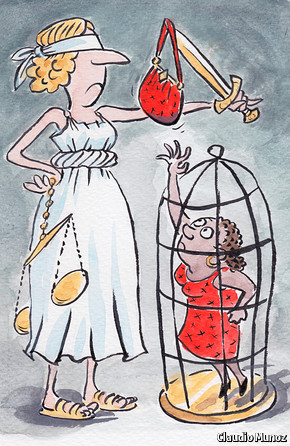
IN LATE 2010 police in Childersburg, Alabama ticketed both Kristy and Timothy Fugatt for driving with expired licence tags. They were fined $148 each, plus another $198 for Mrs Fugatt, whose license had expired. They could not afford to pay, so they were placed on probation under the supervision of Judicial Correction Services (JCS), a private company that manages probationers for roughly 200 misdemeanor courts in the south-eastern United States.
JCS also charged each of them a $45 monthly service fee. When they fell behind on their payments, they were charged more fees and threatened with jail. In February 2012 they claim that a Childersburg policeman arrested them at their home, threatened them with a Taser, told them their children would be placed in state care and took them to prison. They were released only after relatives brought $900 to the Childersburg jail. (Robert McMichael, the head of JCS, refused to comment on any of these allegations.)
Monthly charges to private-probation companies are just one of a growing array of fees levied by America’s criminal-justice system. Such fees are distinct from fines, imposed to punish or deter. Their aim is to make wrongdoers cover some of the costs of the system that punishes them.
Another law for the poor
For example, a 2010 report by the American Civil Liberties Union (ACLU) found that fees and fines covered two-thirds of the operating budget of the Orleans Parish criminal court in Louisiana. That is the appeal of private-probation firms: small fines often go unpaid because local governments cannot afford to chase every speeding ticket. JCS claims that without officers overseeing probation, only 30% of offenders complete it; with JCS’s services that rises to 70%. Even more appealing to cash-strapped municipalities, private-probation companies offer their services at no cost to the taxpayer. Instead, boasts JCS, “Supervision is completely offender-funded.”
Defendants who cannot pay fees upfront are put on payment plans, which often come with start-up and monthly administrative fees. Many of these fees are small, but for poor Americans they impose an additional burden that can last long after a judicially-imposed sentence has ended. A 2010 study by the Brennan Centre for Justice, a law and public-policy institute, found that at least 13 of the 15 states with the largest prison populations allowed probation to be extended beyond the judicially-imposed terms for non-payment of criminal-justice debt. A judgment handed down in July 2012 against the town of Harpersville, Alabama, which hired JCS to manage its misdemeanor probation, found that fees could turn a $200 fine into a 41-month-long, $2,100 ordeal.
That same judgment accused Harpersville of operating a “debtors’ prison”, though the judge noted that “a more accurate description of the Harpersville Municipal Court practices might be that of a judicially sanctioned extortion racket.” Harpersville, like many other places, jailed people who failed to pay probation fines and fees—although the cost of imprisonment often exceeds the costs for which they are liable. In 2010 North Carolina’s Mecklenburg County spent over $40,000 jailing people for non-payment of criminal-justice debt, and collected just $33,476 from them. Courts in Orleans Parish routinely offered defendants the choice of 30 days in prison or $100 in fines, even though the city had to pay the parish sheriff $22 per day for each inmate it sentenced, and the federal appellate court for the circuit that includes Louisiana found such “fine or time” sentences illegal.
That Brennan Centre study found that nine of the 15 American states with the largest prison populations permit “collection fees” on criminal-justice debt, which are often payable to private firms. Only one of the 15 (Texas) exempts penniless defendants from additional collection fees.
All this occurs routinely, though the Supreme Court ruled in 1983 that before a court jails someone for failing to pay a fine or fee, it must first ensure that his failure to pay was willful—that he could have paid but chose not to. Jailing someone because he cannot pay violates the 14th Amendment’s Equal Protection Clause. Similarly, 13 of the 15 states studied by the Brennan Centre charge defendants public-defender fees ($50 for a misdemeanor and $100 for a felony defense in Florida; in Virginia, as much as $1,235 for some felonies), even though the Supreme Court ruled in 1963 that the Sixth Amendment required courts to provide lawyers at no charge for indigent defendants.
In some states people with outstanding criminal-justice debt cannot vote. In others they lose public benefits such as food stamps and housing assistance. Some states suspend driving licenses, making it harder for people to get to the jobs they need to do to pay off their debt. And beyond that, as Eric Balaban of the ACLU notes, such fees create “a two-tiered system of justice, in which the wealthy can satisfy the system quickly, while a poor person charged with the same offence can face years of penalties.”










